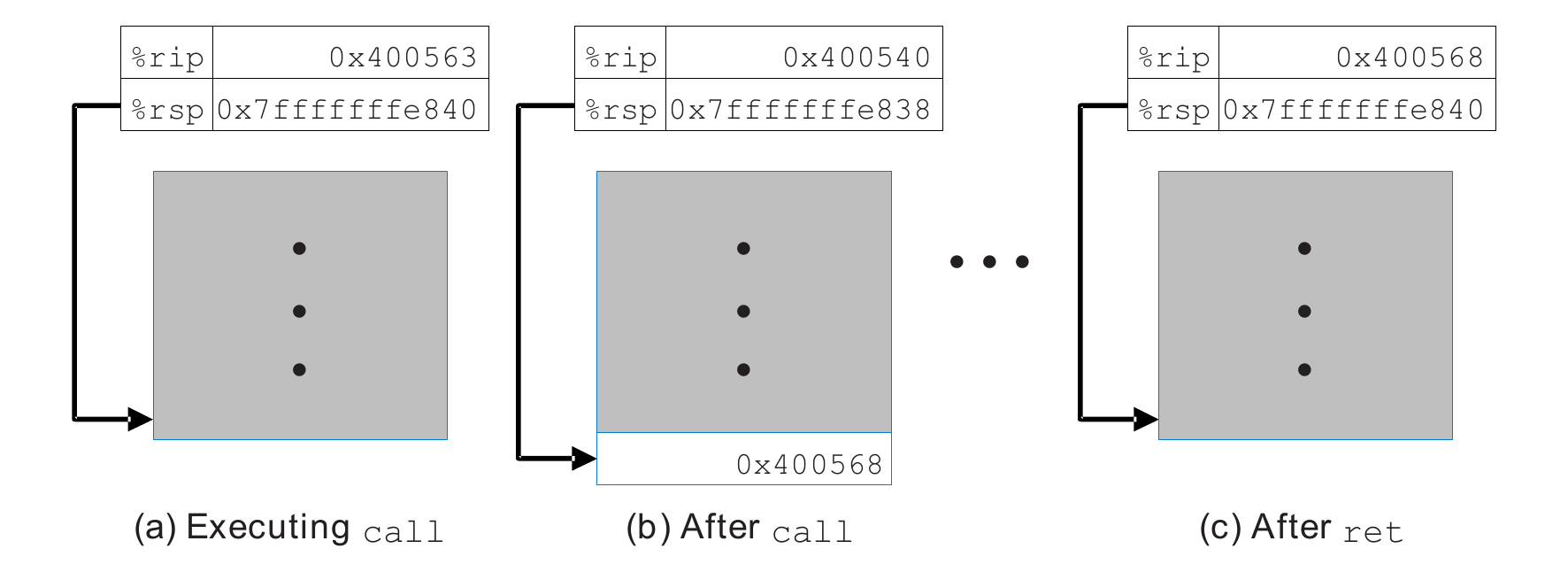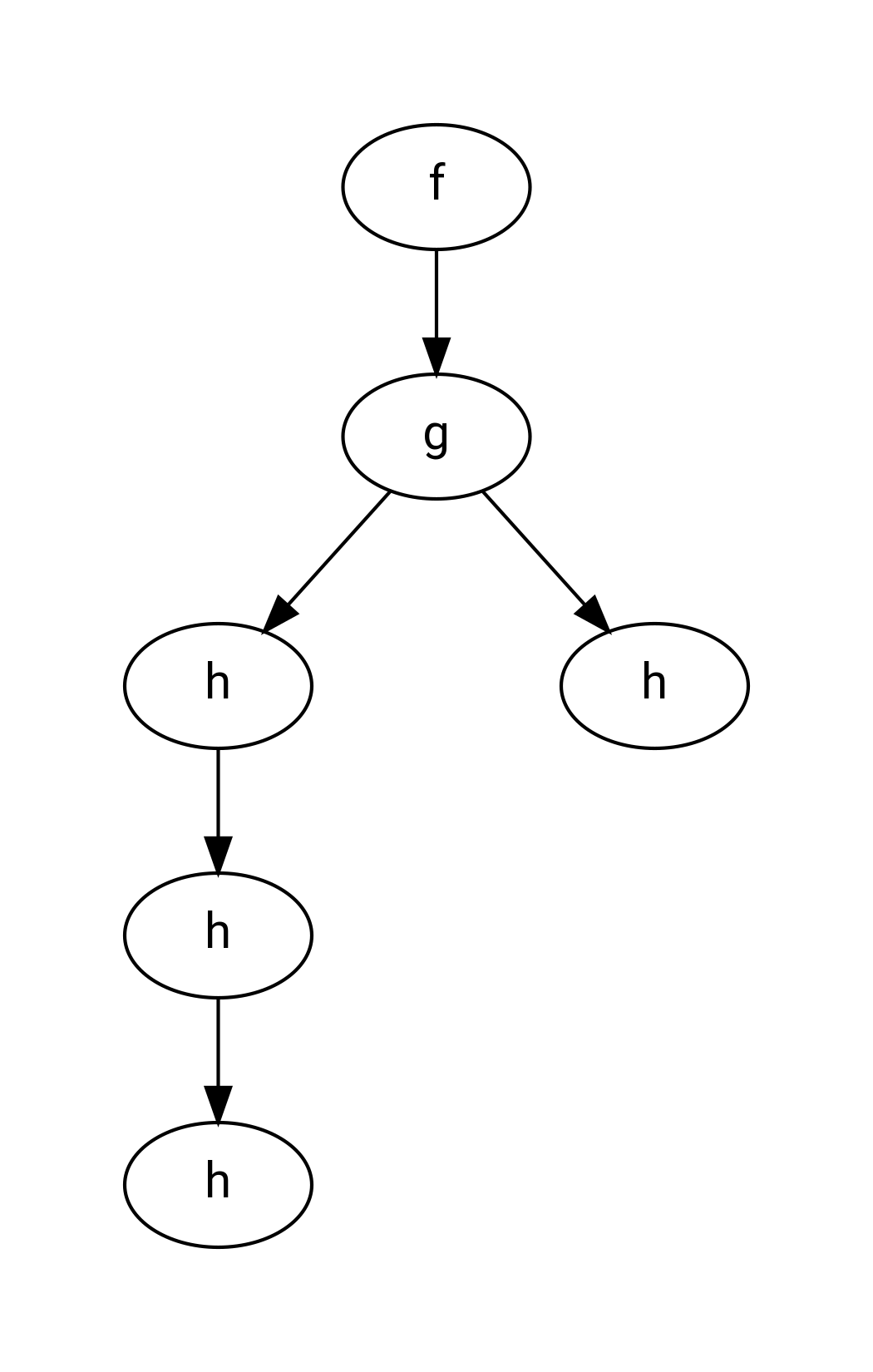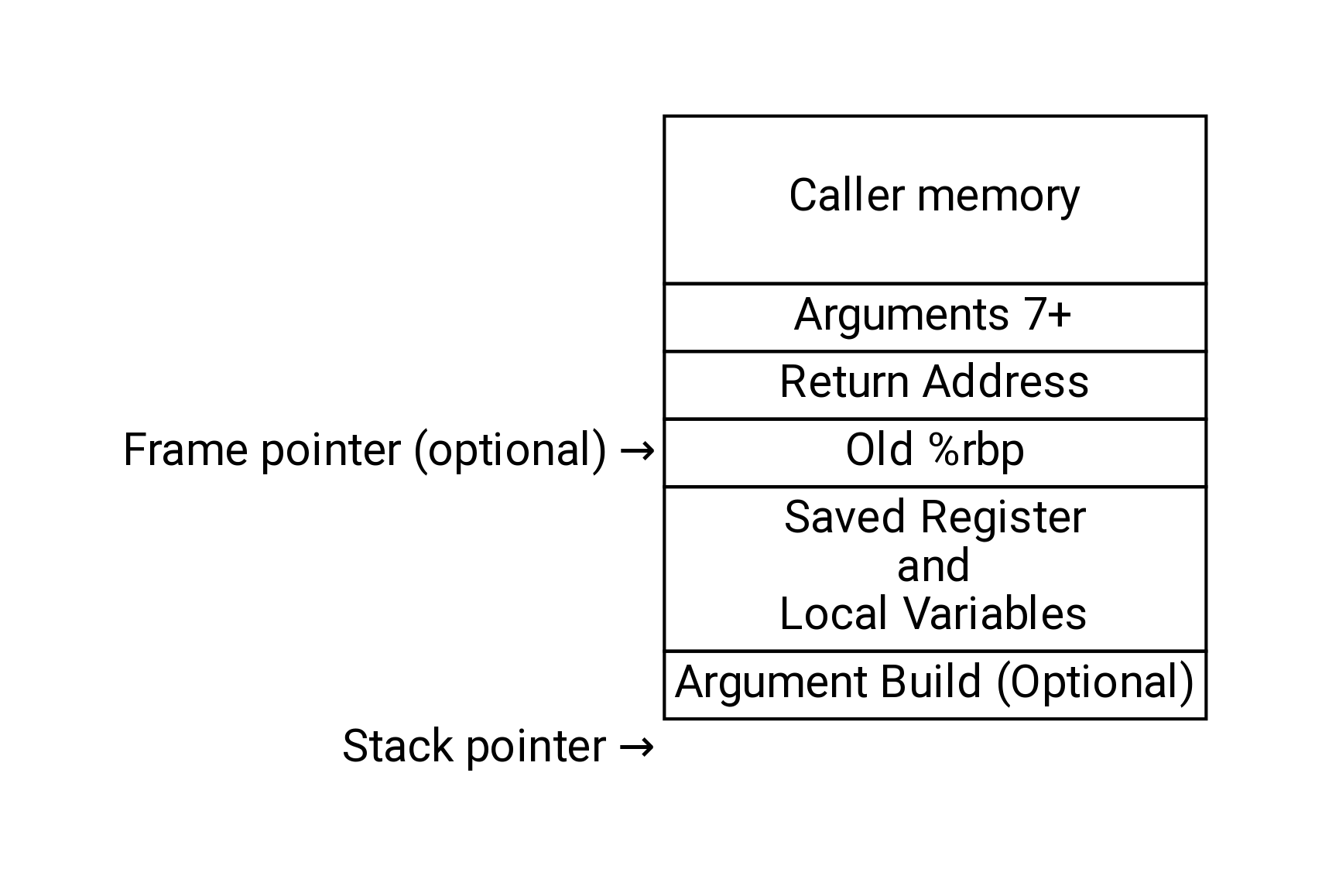Machine Programming Procedures
CSC 235 - Computer Organization
References
- Slides adapted from CMU
Outline
- Procedures
- Mechanisms
- Stack Structure
- Calling Conventions
- Passing Control
- Passing Data
- Managing local data
- Illustration of Recursion
Mechanisms in Procedures
- Passing control
- To beginning of procedure code
- Back to return point
- Passing data
- Procedure arguments
- Return values
- Memory management
- Allocate during procedure execution
- Deallocate upon return
Mechanisms in Procedures (continued)
- Mechanisms all implemented with machine instructions, but the choices are determined by designers. These choices make up the Application Binary Interface (ABI).
- x86-64 implementation of a procedure uses only those mechanisms required
x86-64 Stack
- Region of memory managed with stack discipline
- Memory viewed as array of bytes
- Different regions have different purposes
- (Like ABI, a policy decision)
- Grows toward lower addresses
- The
%rspregister contains the lowest stack address (“top” of stack)
x86-64 Stack: Push
Syntax:
pushqSrc- Semantics:
- Fetch operand at Src
- Decrement
%rspby 8 - Write operand at address given by
%rsp
x86-64 Stack: Pop
Syntax:
popqDest- Semantics:
- Read value at address given by
%rsp - Increment
%rspby 8 - Store value at Dest (usually a register)
- Note that the memory does not change, only the value of
%rsp
- Read value at address given by
x86-64 Stack Example

Code Examples
C code
void multstore (long x, long y, long *dest) { long t = mult2(x, y); *dest = t; }Assembly
multstore: push %rbx # save %rbx mov %rdx, %rbx # save dest callq mult2 # mult2(x, y) mov %rax, (%rbx) # save at dest pop %rbx # restore %rbx retq # return
Code Examples
C code
long mult2 (long a, long b) { long s = a * b; return s; }Assembly
mult2: mov %rdi, %rax # a imul %rsi, %rax # a * b retq # return
Procedure Control Flow
- Use stack to support prodecure call and return
- Procedure call:
calllabel- Push return address on stack
- Jump to label
- Return address:
- Address of the next instruction right after call
- Procedure return:
ret- Pop address from stack
- Jump to address
Procedure Control Flow Example

Procedure Data Flow
- The first six integer or pointer parameters are passed in registers:
%rdi%rsi%rdx%rcx%r8%r9
Subsequent parameters (or parameters larger than 64 bits) should be pushed onto the stack, with the first argument topmost.
Return value in
%rax
Stack-Based Languages
- Languages that support recursion
- Code must be “reentrant”
- Multiple simultaneous instantiations of single procedure
- Need some place to store state of each instantiation
- Arguments
- Local variables
- Return pointer
- Code must be “reentrant”
Stack-Based Languages (continued)
- Stack discipline
- State for a given procedure needed for limited time
- From when called to when returned
- Callee returns before caller does
- State for a given procedure needed for limited time
- Stack allocated in frames (activation records)
- State for single procedure instantiation
Call Chain Example
f: callsgg: callshtwiceh: recursive

Stack Frames
- Contents
- Return information
- Local storage (if needed)
- Temporary space (if needed)
- Management
- Space allocated when procedure is entered
- “set-up” code
- Includes push by
callinstruction
- Deallocated when returned from procedure
- “finish” code
- Includes pop by
retinstruction
- Space allocated when procedure is entered
x86-64/Linux Stack Frame
- Current stack frame (“top” to bottom)
- “Argument build:” parameters for function about to call
- Local variables if cannot keep in registers
- Saved register context
- Old frame pointer (optional)
- Caller stack frame
- Return address (pushed by
callinstruction) - Arguments for this call
- Return address (pushed by
x86-64/Linux Stack Frame

Example: incr
C code
long incr(long *p, long val) { long x = *p; long y = x + val; *p = y; return x; }Assembly code
incr: movq (%rdi), %rax addq %rax, %rsi movq %rsi, (%rdi) ret
Register Saving Conventions
- When procedure
foocallsbar:foois the callerbaris the callee
- Conventions
- “Caller Saved”
- Caller saves temporary values in its frame before the call
- “Callee Saved”
- Callee saves temporary values in its frame before using
- Callee restores them before returning to caller
- “Caller Saved”
x86-64 Linux Register Usage
%rax- Return value
- Caller-saved, can be modified by procedure
%rdi, \(\ldots\),%r9- Arguments
- Caller-saved, can be modified by procedure
%r10,%r11- Caller-saved, can be modified by procedure
x86-64 Linux Register Usage
%rbx,%r12,%r13,%r14- Callee-saved, callee must save and restore
%rbp- Callee-saved, callee must save and restore
- May be used as frame pointer
- Can mix and match
%rsp- Special form of callee save
- Restored to original value upon exit from procedure
Recursive Function Example
C code
long pcount_r(unsigned long x) { if (x == 0) { return 0; } else { return (x & 1) + pcount_r(x >> 1); } }
Recursive Function Example
Assembly
pcount_r movl $0, %eax # base case testq %rdi, %rdi # | je .L6 # | pushq %rbx # caller save movq %rdi, %rbx # set up call andl $1, %ebx # | x & 1 shrq %rdi # | x >> 1 call pcount_r # recursive call addq %rbx, %rax # result popq %rbx # function completion .L6: rep; ret # base case
Observations About Recursion
- Handled without special consideration
- Stack frames mean that each function call has private storage
- Register saving conventions prevent one function call from corrupting another’s data
- Stack discipline follows call/return pattern
- Also works for mutual recursion
x86-64 Procedure Summary
- Important Points
- Stack is the correct data structure for procedure call/return
- If P calls Q, then Q returns before P
- Recursion handled by normal calling conventions
- Can safely store values in local stack frame and in callee-saved registers
- Put function arguments at top of stack
- Return result in
%rax
- Pointers are addresses of values